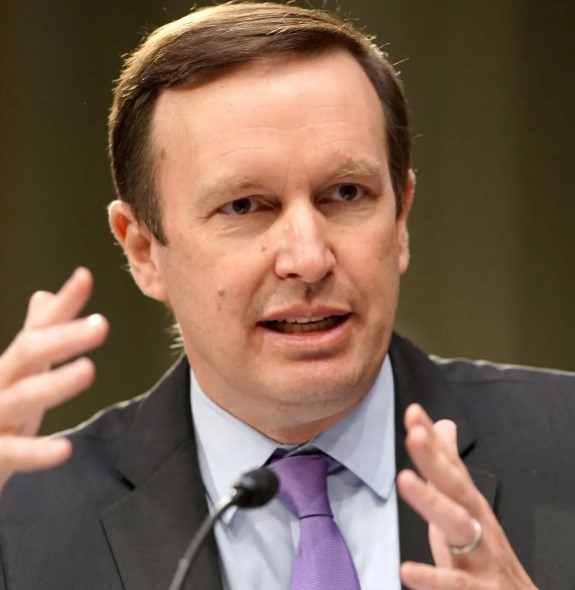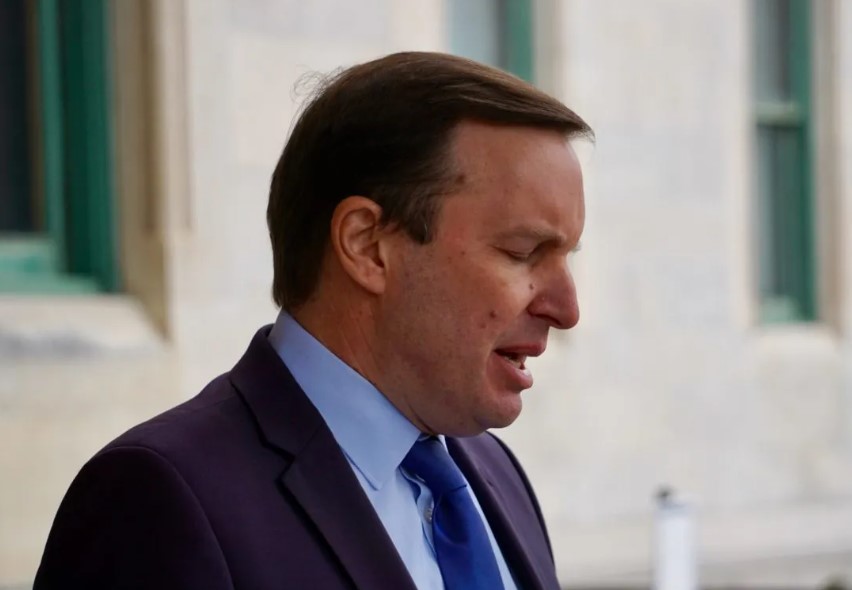How to contact Chris Murphy ? Chris Murphy Contact Address, Email ID, Website, Phone Number

Hello friends! Are you a follower of Chris Murphy ? Are you searching on google for How to contact Chris Murphy ? What is Chris Murphy WhatsApp number, contact number, or email ID? What are Chris Murphy hometown and citizenship address? What is Chris Murphy Facebook, Twitter, or Instagram ID? Find out all these things in our article below…
Today I will tell you about HOW TO CONTACT Chris Murphy ?

He served in the House of Representatives of the United States (2007–13).Murphy was born in New York City’s suburb. His family moved to a suburb of Hartford, Connecticut, as he was a child, where his father had a legal practise. In 1996, he graduated from Williams College with a Bachelor in History and Political Science with a year abroad from the University of Oxford. Murphy then studied law (J.D., 2002), in which he met Catherine Holahan, at the University of Connecticut. The couple married later (2007) and had two children.
Murphy was elected as a student (1998) to the House of Representatives in Connecticut, where he served from 1999 to 2003. Then he joined the State Senate (2003–06), where he served last year as assistant Senate leader. Murphy sponsored many socially progressive measures in the Connecticut legislature, including successful efforts to enhance the state standards for self-emissions, the ban on indoor smoking in public areas and restaurants and to promote civil unions and, eventually, marriage equality. During that period he practised law in Hartford, which was specialised in immobilisation.
In 2006, Murphy was victorious in the U.S. House of Representatives and the following year he took office. In 2012, he ran for the U.S. Senate and in as many years he defeated Republican challenger Linda McMahon. Murphy joins the Senate officially in 2013.
Murphy became a Liberal-to-Moderate Democrat while in Congress. Following the 2012 shooting at Sandy Hook School in Newtown, Connecticut, the National Rifle Association was assaulted in opposition to the gun reform. He was a vocal proponent of the Patient Protection and Affordable Care Act (2010), helping both the House and the Senate to block Republican efforts to abrogate or to defuse its provisions. He was also active in public conservation efforts, and he has supported or co-sponsored various laws on the health and education of children.
Williams College, a private coeducational higher educational institution, was established in 1791 and founded in Williamstown, Massachusetts, USA, as a college in 1793. Like many other colleges in New England, the Congregational Church was established by Williams but is today non-confessional. It provides Liberal bachelor’s and degree programmes in visual arts and applied arts and social sciences. Special programme expedited and honours, as well as independent study and study possibilities are available abroad. Williams is involved in Twelve College Exchange and cross-registration arrangements with the Massachusetts College of Liberal Arts (previously North Adams State College) and Bennington College are maintained.

Notable campus structures include Hopkins Hall, named after past President of college, Mark Hopkins; Chapin Hall, which houses the Chapin Rare Books Library; and Lawrence Hall, home to the Williams College Museum of Art. The poet William Cullen Bryant (who is reported to have penned his “Thanatopsis” there) and the President James A. Garfield are among his renowned former students. The total registration is roughly 2,000.
U.S. Senate, one of the two houses of the U.S. Congress, formed in 1789 under the Constitution. For six years, each state elects two senators. The terms of around 1/3 of the membership in the Senate expire every 2 years and are labelled “the house that never dies.”
The role of the Senate was designed as a check for the democratically elected House of Representatives by the Founding Fathers. Each state is thereby equally represented, irrespective of size or population. In addition, the election to the Senate was indirect, by state legislatures, until the 17th amendment to the Constitution (1913). They are now directly elected by the electorate of each state.
The Senate has important powers under the provisions on “advice and consent” (Article II, Section 2 of the Constitution). The ratification of treaties requires the two thirds of the majority of all senators present and simple major public appointments, including those of cabinet members, ambassadors and the judges of the Supreme Court, to be endorsed by a simple majority. The Senate adjudicates also the prosecution of the House of Representatives, which requires a two-thirds majority for conviction.
As in the House of Representatives, the process and organisation dominate the political parties and the committee system. Each party elects a leader to organise Senate activity, often a senator with a substantial power in his/her right. The head of the major party is known as the leader of the majority, while the opposition leader is known as the leader of the minority. The Senate leaders play a major influence in the appointment of their party members to the Senate committees, which consider legislation and process legislation and exercise general control of government agencies and departments. The Vice President of the United States is the President of the Senate but can only vote if there is a tie. In the absence of the vice president, the chairman pro tempore – usually the longest-serving party member – is the chairman of the Senate.
Seventeen permanent committees comprise mainly key policy topics, each with personnel, budgets and several sub-committees. The chairman of each committee is a majority party member. The standing committees on appropriations, finance, government operations, international relations and the judiciary are also important. Thousands of proposals are referred to the committees at every session of Congress, although a percentage of these proposals are taken up by the committees. The final language for a law is discussed at “markup” sessions that may be open or closed. The Committee holds hearings and calls for witnesses to provide witness to the legislation before it. Selected and special committees shall also be established to conduct research or inquiries and report to the Senate; these committees shall encompass ageing, ethics, Indian affairs and intelligence.

The fact that the Senate is smaller allows for a wider debate than is customary in the House of Representatives. To control a filibuster—unending discussion which obstructs legislative measures—three-fifths (60 senators) of the membership must vote for cloture. (The cloture Senate rule was construed in 2013 to make it possible for all presidential nominees except for those before the Supreme Court to be held to hold a vote by majority vote and the rule in 2017 was similarly modified for appointments to the Supreme Court.) If the legislation under debate changes the rules of the Senate, cloture can only be used after two thirds of those present have voted. The structure of party control in the Senate is less elaborate; the position of influential senators can be more important than the position (if any) of the party.
Constitutional provisions for the Senate membership require a minimum age of 30 years, a nine-year citizenship of the United States and domicile in the State from which the members of the Senate are elected.
In the United States, the Democratic Party is one of the two main political parties, while the Republican Party is the other.
During its more than two centuries of existence, the Democratic Party altered considerably. In the 19th century it supported or tolerated slavery, and after the American Civil War it opposed civil rights measures to maintain Southern support. It underwent substantial ideological reorganisation during the mid-20th century and rebuilt itself as a party that supports organised labour, the civil rights of minorities, and progressive reform. Since the 1930s New Deal of President Franklin D. Roosevelt the party has also tended to favour more government interference in economic matters and opposing government engagement in citizens’ private, non-economic issues. In the 1870s, the artist Thomas Nast popularised the Democratic Party logo, the donkey; though used widely, it was never officially approved by the party.
The Democratic Party is the oldest and one of the oldest political parties in the globe in the United States. It goes back to 1792 when Thomas Jefferson’s followers took the Republican label in order to stress their anti-monarchical ideals. A decentralised government with limited power was proposed by the Republican Party, sometimes known as the Jefferson Republican Party. The Federalist Party, led by Alexander Hamilton, was a strong central government in the early years of the Republic. The Jefferson faction was formed by an anti-federal party that had moved in favour of the insertion to the Constitution of the United States of a Bill of Rights. The federalists termed the Democratic-Republican Party Jefferson’s faction, in an attempt to recognise the disarray created by the “radical democrats” of 1789. Following the election of the Federalist John Adams in 1796, the Republican party became the first opposition party in the republic and in 1798 the Republicans made its official name the derisive Democratic-Republican mark.
Murphy was elected as a student (1998) to the House of Representatives in Connecticut, where he served from 1999 to 2003. Then he joined the State Senate (2003–06), where he served last year as assistant Senate leader. Murphy sponsored many socially progressive measures in the Connecticut legislature, including successful efforts to enhance the state standards for self-emissions, the ban on indoor smoking in public areas and restaurants and to promote civil unions and, eventually, marriage equality. During that period he practised law in Hartford, which was specialised in immobilisation.
In 2006, Murphy was victorious in the U.S. House of Representatives and the following year he took office. In 2012, he ran for the U.S. Senate and in as many years he defeated Republican challenger Linda McMahon. Murphy joins the Senate officially in 2013.
Murphy became a Liberal-to-Moderate Democrat while in Congress. Following the 2012 shooting at Sandy Hook School in Newtown, Connecticut, the National Rifle Association was assaulted in opposition to the gun reform. He was a vocal proponent of the Patient Protection and Affordable Care Act (2010), helping both the House and the Senate to block Republican efforts to abrogate or to defuse its provisions. He was also active in public conservation efforts, and he has supported or co-sponsored various laws on the health and education of children.
Adams was defeated by Jefferson in 1800, whose triumph led to an era of long-running democratic-republican rule. Jefferson was comfortably reelected in 1804, and James Monroe (1816 and 1820) and the Republican Democrats James Madison (1808 and 1812) were subsequently elected. By 1820 the Federalist Party had become the only major political party in the country, leaving the Democratic-Republican people and allowing Monroe to run the presidential election unchallenged.
New states joined the Union in 1820s by relaxing voting regulations and by adopting laws providing for the direct choice of presidential electors by electors (electors had previously been appointed by state legislatures). These revisions divided the DR into factions, each nominating its own presidential candidate in 1824. The congressional caucus nominated Georgia’s William H. Crawford, while the leaders of the party’s two largest factions, Andrew Jackson and John Quincy Adams, also sought the Presidency; Henry Clay, the Speaker of the House of Representatives, was nominated by the legislatures of Kentucky and Tennessee. Jackson got the most popular and electoral votes, but the necessary majority in electoral college was not received by any candidate. On the occasion of the election to the House of Representativas (as provided for in the Constitution), Adams, who won the House vote and subsequently nominated Clay Secretary of State, received his support — which was finished the fourth and hence excluded from consideration.
Despite the victory of Adams, tensions lingered between the Adams and the Jackson camps. The allies of Adams, representing the interests of the East, dubbed themselves National Republicans. Jackson, whose power resided in the South and West, termed simply as Democrats to his followers (or as Jacksonian Democrats). In the 1828 presidential election, Jackson defeated Adams. In 1832, at one of the first national political conventions in the country (the first Convention was held by the Ant-Masonic Movement in the previous year), the Democrats nominated Jackson for chair, drafted a party platform and set the rule that needed to get the votes of at least two-thirds of the national co‐op nominees from the presidents of both parties. This law, which was only removed in 1936, essentially gave the veto power to minority groups in the selection process and needed agreements to have dozens of votes to decide a presidential nominee. (Presidential candidate John W. Davis, in 1924, needed more than 100 votes to gain his appointment.) Jackson was comfortably reelected in 1832, but his diverse opponents, whistlingly called him “King Andrew,” formed the Whig Party with the old Republicans, named for the political movement of England that opposed absolute monarchy in the 17th centure (see Whig and Tory).
The Democrats won all but two presidential elections from 1828 to 1856. (1840 and 1848). During the 1840s and 50s, however, the Democratic Party endured severe internal difficulties over the question of extending slavery to western areas, as it was formally termed in 1844. The Southern Democrats, led by Jefferson Davis, intended to allow slavery across all regions and the Northern Democrats, led by Stephen A. Douglas, suggested that the issue should be decided on by referendum for each region. The question divided the Democrats on their 1860 presidential convention, in which South Democrats selected John C. Breckinridge and Douglas was nominated by Northern Democrats. The election of 1860 included John Bell, the nominee of the Constitutional Union Party and Abraham Lincoln, the candidate of the newly founded Republican Anti-Slavery Party (1854), which had no connections with the Republican Party of Jefferson of decades ago. With the Democrats hopelessly split, Lincoln was elected president, with only around 40% of the national vote, while Douglas and Breckinridge got 29%, 18%, respectively.
Most political experts consider the elections of 1860 to be the first of the three “critical” elections in the country – a competition that generated sharp but lasting changes in party loyalties across the country. (Some scholars also describe the election of 1824 as crucial) It established the Republican and Democratic parties as the major parties in a system that was apparently two parties. In the federal election from the 1870s to the 1890s, the parties were in a rough balance, except in the south, where the Democrats were dominant because the majority of whites blameed the Republican Parti for both the ensuing American Civil War (1861–65) and the Recovery (1865–77). The South remained steadfastly democratic for almost a century despite the Fifteenth Amendment repressive legislation and physical intimidation to discourage new African Americans from voting (see black code). However, the United States slid into an economic slump during the second term of Cleveland. At that time, the party was fundamentally conservative and agricultural, opposed the interests of big industry (particularly protective tariffs) and favoured cheap-money policies that maintained low interest rates.
(1)Full Name: Chris Murphy
(2)Nickname: Chris Murphy
(3)Born: 3 August 1973
(4)Father: Not Available
(5)Mother: Not Available
(6)Sister: Not Available
(7)Brother: Not Available
(8)Marital Status: Married
(9)Profession: Politician
(10)Birth Sign: Leo
(11)Nationality: American
(12)Religion: Not Available
(13)Height: Not Available
(14)School: Not Available
(15)Highest Qualifications: Not Available
(16)Hobbies: Not Available
(17)Address: White Plains, New York, U.S
(18)Contact Number: 202-224-4041
(19)Email ID: Not Available
(20)Facebook: https://www.facebook.com/ChrisMurphyCT
(21)Twitter: https://twitter.com/ChrisMurphyCT
(22)Instagram: https://www.instagram.com/chrismurphyct/
(23)Youtube Channel: https://www.youtube.com/user/SenChrisMurphy
read also: Richard Blumenthal Contact Address, Phone Number, Whatsapp Number, Email ID, Website